There is potential for co-operation between companies in the Yorkton region and those in the Netherlands.
At least that was the view put forward by Johannes Vervloed, Consul General of the Kingdom of the Netherlands during a brief presentation at a social in Yorkton last Wednesday.
Vervloed, who toured several companies earlier in the day including Milligan Biotech in Foam Lake, and LDM Foods and Grain Millers at Yorkton, said the region has a lot of things going for it.
"We really have the feeling we're in the heart of it," he said, pointing to canola, potash and oil and gas. " There is a lot of things going on in this part of the province."
Vervloed said he has believed there are chances for co-operation, adding they have actively worked on "an inventory of these opportunities."
The visit was to begin to confirm those opportunities, he said adding "the proof of pudding is always in eating it."
As an example of opportunity Vervloed explained how the European Union has initiated a phase in, by 2020 of a 10 per cent use of biofuel in diesel, a mandate which could be met by the use of canola oil.
Vervloed said Europe wants to "use more renewables" in terms of energy. "We'd like to become a bio-based economy, especially in Netherlands."
In terms of renewable oil for biodiesel, Vervloed said Netherlands cannot produce enough.
"We have to import it," he said.
While admitting there are obstacles to overcome in terms of importing canola oil to the Netherlands, Vervloed said they are not things that could not be overcome.
Vervloed said in general terms European consumers have become very aware of the environment.
"They want products to be sustainable," he said adding it is a huge plus " if you can say the environment has been taken care of."
In that regard representatives of a Dutch company dealing in tracking products from raw material to consumer was on the tour with Vervloed.
Vervloed said in talks with federal government officials it was noted Canada is "a big country produces a lot of products for export," which generally go out as raw materials. With that in mind he said there are opportunities to create value-added.
Vervloed said Saskatchewan Premier Brad Wall echoed the sentiments in saying "we have many resources our biggest challenge is how to bring those products to the world markets."
Europe is one of the markets to look to, said Vervloed.
"Europe is an important market already. It will become even more important," he said, adding Canada is currently negotiating a free trade deal with the European Union, a deal he said "will be to the advantage of both of us."
Ultimately the key to creating trade is something which is beneficial for both sides, said Vervloed, adding the Netherlands is already the second largest foreign investor in Canada behind only the United States.
Vervloed also noted some $50 million in Canadian goods enter Europe through the Port of Rotterdam, which he said was a gateway to Europe for Canadian goods.
Such investment makes sense in terms of the historic connection between the two countries.
It was Canadian forces which liberated the Netherlands during the Second World War, said Vervloed, adding as a way of his people's continuing thanks for that, the Netherlands ships 500,000 tulips to Ottawa each spring.
"We were liberated by you. We have not forgotten," he said.
It was during the war years the then Princess of Netherlands was sent to Canada to keep her safe. During her time in Canada she gave birth to a daughter. A small section of Ottawa was actually made part of the Netherlands so that she was born on Dutch soil, he explained.
Locally, Insinger was pioneered by Dutch immigrants. Vervloed said there are about one million Canadians who trace their roots to the Netherlands.
Vervloed said the visit was essentially a chance to "look each other in the eyes and see where we can cooperate It's improving on the strong bond we already have."




